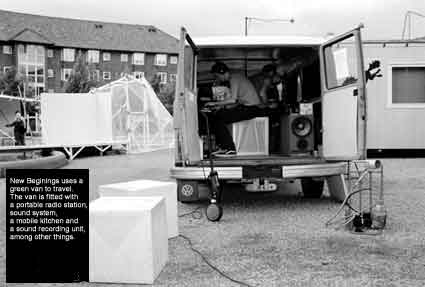
B&W: When and why did the name of
New Beginings form and why does the incorrect spelling seem to
be such an important part of it?
NB: The name was founded in Göteborg
in mid 2000 as a streetart sticker campaign. The incorrect spelling
was part of it from the very begining. At that time we had already
formed some sort of group and had been working together for some
time, but without a name. We did not want to constitute a name
or product that would be automatically connected to the persons
involved, because we had decided to keep our work anonymous. Although
certain aspects made our choice of a non-name formation very difficult
and we agreed that the use of a collective name would not contradict
the vision of keeping the work anonymous or keeping the group
a relatively open formation. We now consider the spelling a way
to illustrate the need of a broader tolerance for mistakes in
our society.
B&W: When did you decide to work
together and why? You also talk about the anonymity of your work,
what is it that makes it important to keep it anonymous?
NB: We decided to work together when we
were talking spontaneously and came up with same thoughts and
ideas about how we wanted to work with art and how to work in
an alternative way. We spent almost half a year just talking without
doing anything concrete, actually. We found out that working as
a group was the ideal form for us and we could take advantage
of each others skills
The anonymity is very important because when New Beginings is
performing actions we don't want to relate what we do to the individuals
involved, we just want to concentrate on that very action taking
part. It's not so important which one is involved in NB, the actual
work is the important part.
B&W: Why have you chosen to perform
your work within the "Art world"?
NB: Most of the work is actually not performed
in an art context. We often get support and help from some part
of the Artscene, but this is in many ways a pragmatic situation.
The freedom to act within the art scene is used by us to gain
certain advantages. That's it.
B&W: What is the difference between
group names and personal names? Doesn't the name of a group focus
even more on the actual name and not its content?
NB: It may do. We feel that we in a sense
are able to bypass that problem by not being a distinct group
formation. We have no manifest and no concrete guidelines for
what constitutes New Beginings. The history of the name (as explained
in the first Q) also gives possibilities to act in a broader sense
than our personal names would. When naming a work New Beginings
several aspects of traditional sovereignty is also bypassed. This
means that there definitely could be more attention drawn to the
name, but that this attention can not be enveloped since the meaning
of the name is only partially explained.
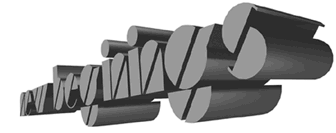
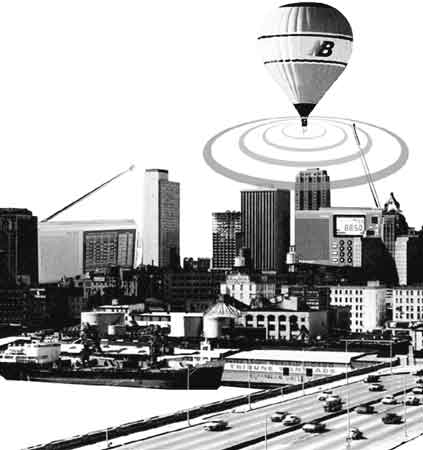
B&W: In one of your work you placed
park benches in specific areas around Stockholm as a politic action
in response to contemporary urban planning. This was later presented
in a newspaper as an art project. Is this a common way for you
to work and can you explain this action a little bit further?
NB: We are glad that you ask this question.
The park bench project was a very specific situation. The whole
thing came out of an idea of just building nice and comfortable
park benches. Last year we began to restore old park benches and
"replaced" them in the city. Then we made an inexpensive
construction that was constructed out of recycled wooden material
and tarpaulin. These benches are really comfortable to both sit
and to lay on. Since the benches were so inexpensive to produce
we were able to distribute them without any great economical effort.
For the same reason we choose not to make any publicity work in
relation to the benches
We already had the resources to produce the benches and, quite
naturally, a park bench doesn't need that much explanation. Later,
when we were asked to do the newspaper project, the whole idea
had been transliterated into something more complex. Therefore
it felt reasonable to write and explain the previous work in a
more abstract and theoretical way. Of course the park benches
were part of a political action and this part of the work was
easy to explain in the newspaper. That is significant for the
way that we are reasoning concerning issues like this. What we
do and in which context we choose to do it is very much a decision
based upon the benefits that can be gained by working in a specific
situation. Again it is pretty much a pragmatic decision.
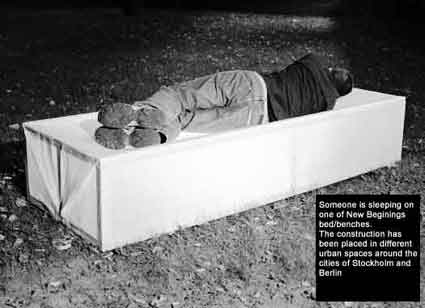
B&W: To build benches in advance
and then place them in the public sphere feels like a respectful
and somewhat mystical approach on an issue that is normally looked
upon as political activism. Don't you ever feel like doing something
in a more direct situation, like a relational performance or something
with a social aspect, or is this maybe something that would contradict
your ideas?
NB: Not at all. On the contrary, we are
very much interested in social aspects and the concrete relation
that can come with a forced situation. It's actually a little
bit symptomatic that you see a possible contradiction in these
two ways of approaching the idea of "direct contact".
The benches have a way to occupy the public space in a very direct
way. Therefore there is no need for further contact in a social
sense. We have done other things where the social aspect is much
more important. Our radio experiments is one such thing.
B&W: Radio experiments?
NB: Yes, we have been working with radio
transmissions for a while. In the begining we made some experiments
with homebuilt transmitters for an event in Berlin, October 2000.
There we used the radio equipment to transmit DJ-sets from the
gallery to our benches that were supplied with a radio receiver
and placed outside the gallery. During the last year we have developed
these experiments in different forms. We are now for example using
a small mobile studio that we can actually carry in a bag and
we are able to reach out through a small city with this equipment.
This technique is enabling us to establish a direct form of communication
regardless of the specific issue that the transmission is concerning.
We have chosen radio as a forum for its unique possibilities in
these fields.

|
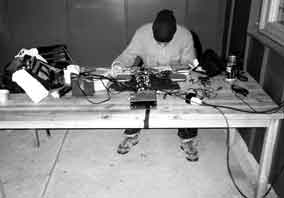
|
Radio has a spectacular strength in distributing
different sound experiment. With radio you, for one, can reach
a much broader public, but most important is that you can present
an audio piece without having to create a scenic performance.
The performer and the listener are in direct contact, but also
sometimes the performer has no concrete knowledge of the existence
of the receiver.
New Beginings will continue to do work
that attemps to give attention to the possibility to act as one
pleases, this can be performed in various ways. Here are some
examples of what one can do:
- Build park benches in an are where it is needed
- Improve or install a public message borrd
- Open a food stand
- Give an open air concert
- Give rise to variety
- Spell something wrong
www.newbeginings.cx

Back to publications
Back to HOME

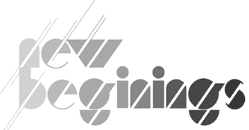 is a group founded on an idea about cooperation
and the benefits gained in working together, using each individuals
in a numerous of fields.Namning the work a New Beginings project
gives everyone the freedom to work anonymously towards a joint
result.
is a group founded on an idea about cooperation
and the benefits gained in working together, using each individuals
in a numerous of fields.Namning the work a New Beginings project
gives everyone the freedom to work anonymously towards a joint
result.





